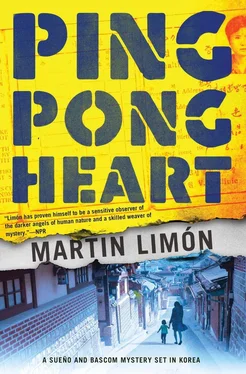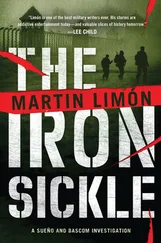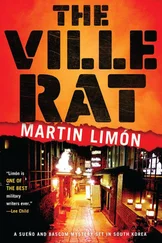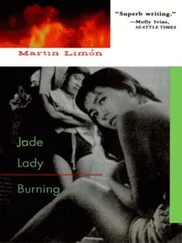Martin Limon - Ping-Pong Heart
Здесь есть возможность читать онлайн «Martin Limon - Ping-Pong Heart» весь текст электронной книги совершенно бесплатно (целиком полную версию без сокращений). В некоторых случаях можно слушать аудио, скачать через торрент в формате fb2 и присутствует краткое содержание. Год выпуска: 2016, Издательство: Soho Press, Жанр: Полицейский детектив, на английском языке. Описание произведения, (предисловие) а так же отзывы посетителей доступны на портале библиотеки ЛибКат.
- Название:Ping-Pong Heart
- Автор:
- Издательство:Soho Press
- Жанр:
- Год:2016
- ISBN:нет данных
- Рейтинг книги:5 / 5. Голосов: 1
-
Избранное:Добавить в избранное
- Отзывы:
-
Ваша оценка:
- 100
- 1
- 2
- 3
- 4
- 5
Ping-Pong Heart: краткое содержание, описание и аннотация
Предлагаем к чтению аннотацию, описание, краткое содержание или предисловие (зависит от того, что написал сам автор книги «Ping-Pong Heart»). Если вы не нашли необходимую информацию о книге — напишите в комментариях, мы постараемся отыскать её.
Ping-Pong Heart — читать онлайн бесплатно полную книгу (весь текст) целиком
Ниже представлен текст книги, разбитый по страницам. Система сохранения места последней прочитанной страницы, позволяет с удобством читать онлайн бесплатно книгу «Ping-Pong Heart», без необходимости каждый раз заново искать на чём Вы остановились. Поставьте закладку, и сможете в любой момент перейти на страницу, на которой закончили чтение.
Интервал:
Закладка:
“She’s a GI business girl,” Mr. Kill told us. “You’re GIs. You go.”
When the KNPs are on a search mission in Itaewon, word spreads fast and people hide like scattering rats. Ernie and I could, if we played it right, draw less attention.
We returned to Yongsan Compound. At the barracks, we changed into our running-the-ville outfits: sneakers, blue jeans, button-down collared sports shirts, and nylon jackets with fire-breathing dragons hand-embroidered on the back; sinuous creatures, with gaping mouths and wicked claws. The caption beneath mine said: Republic of Korea, 1972 through 1975 . Ernie’s not only had a dragon on the back, but a voluptuous lady locked in a less-than-subtle embrace. He’d added an additional epitaph, I’ve served my time in hell . Overstated, but most GIs not only weren’t into subtlety, but didn’t know what the word meant. An assignment in Korea was officially termed a “hardship tour,” but it was hardly a sojourn in hell. Still, I didn’t quibble. Our object, after all, was to fit in.
I used the military phone in the barracks lobby to dial the CID office. Staff Sergeant Riley answered on the first ring.
“You’re gonna do what?” he said.
“We’re gonna run the ville.”
“You’ve got a damn murder to solve.”
“And this is how we’re going to do it.”
“The Provost Marshal wants you back here, in uniform, giving him a full report.”
“No time now.” I explained the urgency to find Miss Jo before she decided to run.
Riley still didn’t like it. “Do you have any idea about what kind of pressure the Chief of Staff is putting on Colonel Brace? They’re livid up at the head shed. A field grade officer hasn’t been murdered in this country since the Korean freaking War.”
“Been that long, huh?”
To me, the premature taking of life was a sin against humanity no matter the rank of the victim.
“Colonel Brace is the Provost Marshal,” Riley continued. “It’s his job to protect people.”
“It’s our job too.”
When he continued to cuss, I hung up on him. Ernie and I trotted out to the jeep.
“They took it well?” he asked.
“They’re delighted with our plan,” I told him.
He hopped behind the wheel of the jeep and started the engine. “I knew they would be.”
– 7-
Delicate flakes of snow drifted in the gentle breeze until they slapped haphazardly onto the grease-stained pavement of the main drag of the Itaewon nightclub district. The afternoon was so dark and overcast that most of the joints had already switched on their neon. Beneath a red glow, we entered the King Club.
The first thing we did was sit at the bar. We ordered two beers; the young bartender wearing a white shirt and black bowtie popped the bottle caps off for us as the middle-aged female cashier took our money.
“You early.”
It was Miss Peik, the senior waitress at the King Club. Koreans often form a family structure in business, even if everyone involved is not related. The King Club’s “parents” were the owners, the aunt was the cashier, the grandson was the young bartender, and the sisters were the cocktail waitresses. Miss Peik, as the oldest cocktail waitress, was uniformly called onni , older sister, by the other girls.
She had “CQ” today, the daytime shift. They’d stolen the term from the US Army. The CQ, or Charge of Quarters, was the GI who was hit with the unfortunate duty of staying up all night in the barracks, forced to be alert and answer the phone in case there were any fires or other emergencies. During the work week, daytime business at the King Club was so slow that they only needed one “CQ” waitress. On weekends, two or three. At night, of course, all the waitresses were on duty, about a dozen of them in a busy joint like the King Club. Holidays were not observed, and each girl was granted only one day off a month.
Miss Peik wrapped her arms around Ernie’s neck. She was a tall, thin woman wearing the bright red smock that was the uniform for the King Club. I pegged her at pushing forty.
“You rabu me?” Ernie asked.
“I rabu you too muchey. You buy me drink?”
“ Ijo jo !” Ernie said. Forget it!
Another phrase I’d taught him. He’d worked hard at memorizing it because it came in so handy.
Miss Peik backed away. “You no rabu me?”
“I rabu you too muchey.” Ernie pulled her back toward him.
While Miss Peik and Ernie horsed around, I asked the bartender where the other waitresses were. The club was empty. None of the two or three dozen cocktail tables held any customers, and the stage where the rock band usually performed was dark. Not unusual for a mid-afternoon on a work day, but I had paid for the beer with a 10,000 won note-about twenty bucks-so they’d know I wasn’t short on cash. By my impatience, I made it clear that if there were no girl for me, I’d pick up my change and suggest to my friend that we try another bar.
The bartender whispered to the cashier. She nodded her approval and he trotted out back. Ten minutes later two more cocktail waitresses joined us. It cost management nothing to bring them on duty. The girls were paid by the month, the equivalent of about forty dollars. Any other money they made was from tips, which were few and far between from their frugal clientele, and from direct payments from any boyfriends they were able to land. Many of them had steady yobo s, GIs who lived in their hooch and paid their rent and, more often than not, bought black market items out of the PX or commissary that the girls then resold for a tidy profit. It was a way of life in Itaewon that had lasted, as far as I could tell, since the end of the Korean War. It had been over twenty years now, and I saw no indication that this method of employing the excess Korean female labor force was about to change.
The two waitresses glommed onto me. I did my best to act interested, but these girls were experts at reading men-that’s how they made their living-and they soon realized I was faking it. One of them stood back and placed her manicured fingernails on her hip. “You have steady yobo ?”
“Not steady,” I said, “not yet.”
“Why not?”
I sipped on my beer. “I met her at the UN Club, about a month ago,” I told them. I described her and then told them her name. “Miss Jo,” I said. “I went to her hooch but the mama-san said she doesn’t live there anymore.”
They pulled Miss Peik away from Ernie. As I suspected, they loved nothing better than a soap opera situation to add spice to their boring days. They conferred amongst themselves, speaking rapid Korean. I pretended not to understand. In fact, much of it I couldn’t understand because they were speaking so quickly and in shorthand bursts. But I did get the gist of it. They had decided that she was the Miss Jo who’d been beaten up by GIs and had to go to the hospital, and they were wondering how much they should tell me.
Finally, Miss Peik stepped toward me. “You likey Miss Jo?”
I sipped on my beer and set it on the bar. “She’s okay.”
“You wanna talk to her?”
“You know where she is?”
“You wait,” Miss Peik told me.
The three women conferred again and one of them left through the back door.
Ernie pulled Miss Peik back toward him and reached out for the other remaining waitress. Both women laughed and pretended to resist, but finally gave in as Ernie Bascom, agent for the 8th United States Army CID, nuzzled their necks and tried to paw at their bodies, especially the round parts.
The building had long been notorious as a brothel in the heart of the Itaewon catacombs. The waitress who led us there had us follow her through twisting pedestrian lanes until finally we reached a crossroads and she pointed and said, “That gate.”
Читать дальшеИнтервал:
Закладка:
Похожие книги на «Ping-Pong Heart»
Представляем Вашему вниманию похожие книги на «Ping-Pong Heart» списком для выбора. Мы отобрали схожую по названию и смыслу литературу в надежде предоставить читателям больше вариантов отыскать новые, интересные, ещё непрочитанные произведения.
Обсуждение, отзывы о книге «Ping-Pong Heart» и просто собственные мнения читателей. Оставьте ваши комментарии, напишите, что Вы думаете о произведении, его смысле или главных героях. Укажите что конкретно понравилось, а что нет, и почему Вы так считаете.












